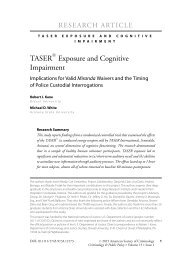1qaSADJ
1qaSADJ
1qaSADJ
You also want an ePaper? Increase the reach of your titles
YUMPU automatically turns print PDFs into web optimized ePapers that Google loves.
Special Focus:<br />
Writing Persuasively<br />
public spaces, and how you’ve learned to smother the rage you felt at “so often being<br />
taken for a criminal.” Beyond giving you the subject for the essay, how does your in-group<br />
identity provide a cache of muscle in your writing?<br />
BS: I was born in 1951 and this is 2005. If you were born black in America at the turn of<br />
the 1950s, you were born at a time when black people lively mainly behind the curtain of<br />
American apartheid. We were barred from white schools. We couldn’t try on clothes in<br />
white department stores. We were barred from living in certain neighborhoods. We were<br />
barred from many occupations, including mainstream white journalism. Most papers<br />
didn’t have any black reporters at all until the advent of the riots in the mid-1960s. Many<br />
of the reporters could name the riots that got them hired.<br />
Segregation, however, had its benefits. For the first 10 years of my life—the formative<br />
years—I grew up in a neighborhood that was classically whole. Segregation forced the<br />
auto mechanic, the doctor, the dentist, the truck driver, the teacher, and the unemployed<br />
person to all live in the same neighborhood. One had a whole range<br />
of role models. The notion that the black community was always a ghetto is a<br />
post-sixties notion. As a kid, I ate green fruit every summer and got sick. My mother<br />
would inevitably have to send for the doctor, who rolled up in this huge, gleaming Buick.<br />
He would take my temperature, calm my mother, and move on. It was very Norman<br />
Rockwell—but the brown-skinned version.<br />
I came from a very strong community, and I experienced some of the worst racism<br />
that the northern United States had to offer. I saw injustice, but I also saw a great many<br />
people who behaved with courage and restraint while demanding respect from the<br />
broader society. This gives me a unique vantage point—and a strong basis from which to<br />
operate as a writer. My past gives me a tremendous emotional wealth—and tremendous<br />
personal stability.<br />
I am descended from slaves on both sides of my family. My paternal great-grandfather,<br />
John Wesley Staples, was conceived in the final days of the Confederacy and born just<br />
after the close of the Civil War. He fought to preserve his land from racist whites in the<br />
Klan-infested South. When there was no school for black children, he and his in-laws built<br />
one—at the intersection of their three properties. They hired a teacher who worked at the<br />
school in exchange for room and board that was shared among the three households. My<br />
great-grandfather, by the way, died 11 years before I was born. Had he lived another decade,<br />
I would have gotten to meet him. And he was the son of slaves. That is huge. That is the<br />
animating factor in my life. I am the last generation for which that will be true.<br />
AP® English Language and Composition: 2006–2007 Workshop Materials



